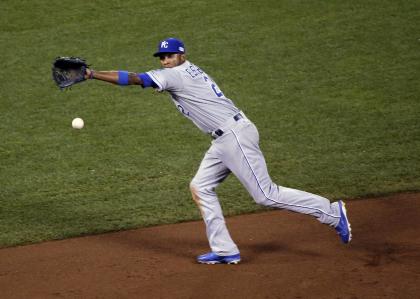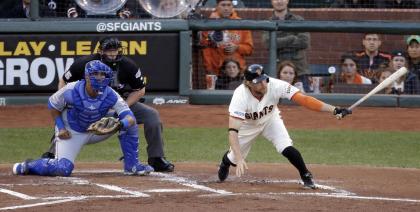Inside the mindset of the most crucial play of Game 4 of the World Series

SAN FRANCISCO – There is no time to think. The bases are loaded, and the game is tied, and 43,066 people are pulsing, and the call comes in from the dugout, and there's a guy busting down the first-base line at 21 mph, and the ball takes two hops straight into Alcides Escobar's glove, and as much as he wants to think, to consider his optimal play, he cannot, because the baseball player who takes time to think is too late already.
Escobar, 27, has fielded tens of thousands of groundballs in his life, maybe 100,000, from all-dirt playgrounds in Venezuela to the finely manicured infields of stadiums like AT&T Park, where he stood at 8:01 p.m. local time Saturday. They readied him for this moment in the World Series, shaped his instinct so he didn't need to think in a key Game 4 situation, inured him to the second-guessing that may accompany it with lesser fielders, cocooned him from blame when that tie game devolved into an 11-4 loss by his Kansas City Royals against the San Francisco Giants.
He made the right choice. Of that he was sure during the postgame chat in which Escobar explained why on the groundball, with Hunter Pence booking toward first base, he threw the ball home to nab Joaquin Arias for a force out, the second of the inning, instead of trying to turn a double play and save rookie Brandon Finnegan from the eventual beatdown that torpedoed the Royals' chance at taking a three-games-to-one lead.
"That's why it's tough, man," Royals second baseman Omar Infante said. "In a second" – he snapped his fingers – "you have to figure out what to do."
"It's not even one second," Escobar said. "If you take a second, it's too long."
[Related: Pablo Sandoval shakes off flu to make an impact]
Every play in baseball involves choices obvious and unspoken, and this play – which preceded by one pitch a two-run single from Pablo Sandoval that broke a 4-4 game wide open – constituted the latter. In the first inning, the Royals watched Pence beat out a double-play ball by hustling down the first-base line, clocked by MLB's StatCast technology at 21.3 mph, almost equivalent to Royals burner Jarrod Dyson's speed from home to first. Kansas City's coaches huddled and agreed: If there's a groundball, go home.
For all the public decisions Royals manager Ned Yost makes, like bullpen management and when to pinch hit, these represent managerial nitty-gritty, inside baseball like yarn-wrapped cork, the equivalent to football coaches trying to break down the Cover 2. Yost wanted to keep the game even, particularly with his polycephalic bullpen monster of Kelvin Herrera, Wade Davis and Greg Holland at the ready.
In this scenario, the Royals considered calling a "3" defense for their infield. A "1" places infielders at standard depth, a "2" at double-play depth, with a "3" halfway between the "2" and "4," which brings infielders in. In bases-loaded situations, the Royals tend to reserve the "3" for a slower runner, because that allows them to turn a double play from a disadvantaged position.
The Royals were more like a 2½ against Pence, with Escobar and Infante behind the cut of the grass but close enough to go home. The only situation in which Escobar believed he could start a double play was on a hard-hit ball hit to his left, taking him toward second base and giving Infante a better angle to take his feed, pivot off the base and fire a relay to first baseman Eric Hosmer.
Pence almost cooperated. He smashed a ball nearly at Escobar, who took one step to his right and backhanded the ball. This is where the lack of time makes his job so difficult. He didn't have time to peek over his left shoulder and see the angle Infante was taking to second base. It needed to be perfect, especially considering Infante has been swallowing anti-inflammatory Toradol pills this month to alleviate a throwing shoulder that could need surgery this month, another factor Royals coaches took into account.
"If he breaks toward second base, he's still having to throw the ball off-balance," Escobar said. "That's not easy. And that guy is running good. I think maybe I can make the double play. But Hunter Pence is great at baserunning. It's hard."
Dyson coined the phrase, "That's what speed do," and Pence here personified it. He is the furthest thing from a graceful runner, arms and legs paroxysmal, his face goofy with effort, but he burns from home to first fast enough to get in the heads of all the Royals.

"You can draw so many things – ifs, ands, wheres, whys – to figure out if Esky would've gotten that ball and turned two," Royals third baseman Mike Moustakas said. "That was Hunter Pence who hit it. He plays the game hard. There's no telling if you turn that ball, either. I think the call was right, and we did a good job of executing it. We just didn't get out of that inning."
On the next pitch, Sandoval pounded a Finnegan sinker into center field, plating two runs. Brandon Belt added a single that scored Pence, the Giants followed in the seventh inning with a four-spot and a 4-1 Royals lead evaporated amid an onslaught of 10 unanswered runs.
Whether Escobar trying to turn a double play would have stanched the flow is, and always will be, the sort of discussion with no answer. He thinks about it anyway, thinks long and hard, because this decision ultimately was his. If Escobar believed he could have turned a double play, he would have fired the ball toward Infante without hesitation. His instincts said no, and the second a shortstop starts doubting his instincts, he might as well burn his glove.
For whatever it's worth, his counterpart agreed with his choice. Brandon Crawford, the Giants' shortstop who shares Escobar's savoir-faire in the field, said: "All depends on how it's hit. You kind of know beforehand that if it's hit to your left and you have a shot at getting two, you go for two. And if it's right at you or to your right, with a guy who runs like Hunter, you go home."
So home he went, Salvador Perez stepping on the plate, umpire Hunter Wendelstedt punching an out, Finnegan getting a chance to work out of the jam. When Sandoval's hit landed in center, Escobar slumped over. He knew second-guessing did no good, knew that everything – Pence's speed, the depth at which he stood, Infante's angle and shoulder health, where the ball was hit – conspired against him turning two.
He knew all that, and still. Two hours later, as he wrapped up explaining why he did what he did, Escobar considered it one more time.
"Maybe," he said. "Maybe I could get a double play."
More World Series coverage on Yahoo Sports:

 Yahoo Sports
Yahoo Sports 
